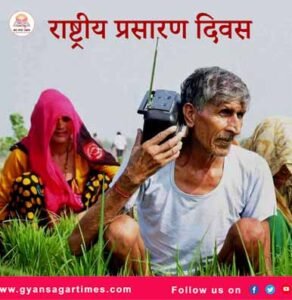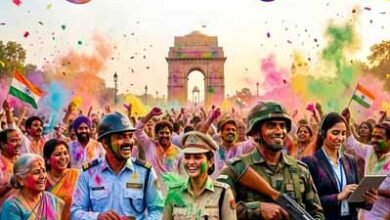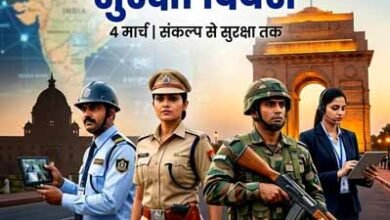
राष्ट्रीय प्रसारण दिवस…
भारत में हर वर्ष 23 जुलाई को राष्ट्रीय प्रसारण दिवस मनाया जाता है. यह दिन भारतीय प्रसारण सेवा के इतिहास में एक महत्वपूर्ण मील का पत्थर है, क्योंकि इसी दिन वर्ष 1927 में इंडियन ब्रॉडकास्टिंग कंपनी (IBC) ने मुंबई से देश के पहले रेडियो प्रसारण की शुरुआत की थी.यह घटना भारत में रेडियो प्रसारण की नींव थी, जिसने आगे चलकर लाखों लोगों के जीवन में संचार और मनोरंजन का एक नया अध्याय जोड़ा।
भारत में रेडियो प्रसारण का इतिहास इंडियन ब्रॉडकास्टिंग कंपनी 23 जुलाई 1927 को बॉम्बे (अब मुंबई) में और 26 अगस्त 1927 को कलकत्ता (अब कोलकाता) में रेडियो स्टेशन की स्थापना की और तब से रेडियो प्रसारण आरम्भ हुआ.
इंडियन ब्रॉडकास्टिंग कंपनी को वित्तीय कठिनाइयों का सामना करना पड़ा और वर्ष 1930 में इसका संचालन अस्थायी रूप से बंद हो गया. बाद में, सरकार ने इस पर नियंत्रण कर लिया और अप्रैल वर्ष 1930 में भारतीय राज्य प्रसारण सेवा (Indian State Broadcasting Service) के रूप में इसका संचालन फिर से शुरू हुआ. 8 जून 1936 को भारतीय राज्य प्रसारण सेवा का नाम बदलकर “ऑल इंडिया रेडियो” (All India Radio – AIR) कर दिया गया. वर्ष 1956 में, राष्ट्रीय प्रसारक के लिए “आकाशवाणी” नाम अपनाया गया, जो भारतीय परंपरा और संस्कृति से प्रेरित था. वर्ष 1957 में, विविध भारती सेवा शुरू की गई, जो जल्द ही फिल्मी संगीत के लिए लोकप्रिय हो गई और जनता के बीच रेडियो की पहुंच को और बढ़ाया. रेडियो के अलावा, भारत में प्रसारण के विकास में दूरदर्शन (Doordarshan) का भी महत्वपूर्ण योगदान रहा है. 15 सितंबर, 1959 को दूरदर्शन की शुरुआत हुई, और 1 अप्रैल, 1976 को यह ऑल इंडिया रेडियो से अलग हो गया.
राष्ट्रीय प्रसारण दिवस रेडियो के महत्व और भारतीय समाज में इसकी भूमिका को याद करने का अवसर है. रेडियो ने भारत के सामाजिक, सांस्कृतिक और राजनीतिक परिदृश्य को आकार देने में महत्वपूर्ण भूमिका निभाई है. रेडियो ने हमेशा समाचार और सूचना का एक विश्वसनीय स्रोत प्रदान किया है, खासकर दूर-दराज के क्षेत्रों में जहां अन्य संचार माध्यमों की पहुंच सीमित है. इसने शिक्षा, स्वास्थ्य जागरूकता और कृषि संबंधी जानकारी फैलाने में भी महत्वपूर्ण भूमिका निभाई है. वहीं, विविध भारती जैसी सेवाओं के माध्यम से, रेडियो ने दशकों तक लाखों लोगों के लिए मनोरंजन का एक प्रमुख स्रोत रहा है.
स्वतंत्रता संग्राम के दौरान, रेडियो ने भारतीयों को एकजुट करने और अंग्रेजों के खिलाफ जगाने में महत्वपूर्ण भूमिका निभाई। आजादी के बाद, इसने स्वतंत्र भारत के निर्माण, राष्ट्रीय एकता को बढ़ावा देने और विभिन्न सरकारी योजनाओं और नीतियों के बारे में जागरूकता फैलाने में मदद की. प्राकृतिक आपदाओं के समय, रेडियो सूचना के प्रसार और लोगों को सुरक्षित रखने में एक महत्वपूर्ण उपकरण रहा है.
राष्ट्रीय प्रसारण दिवस केवल एक तकनीकी उपलब्धि का उत्सव नहीं है, बल्कि यह उस सांस्कृतिक पुल का प्रतीक है जिसने भारत को एक सूत्र में बांधा. यह दिन हमें याद दिलाता है कि कैसे एक आवाज़, एक तरंग, एक प्रसारण पूरे देश को जोड़ सकता है.
========== ========= ===========
National Broadcasting Day…

National Broadcasting Day is celebrated every year on 23 July in India. This day is an important milestone in the history of the Indian Broadcasting Service, because on this day in the year 1927, the Indian Broadcasting Company (IBC) started the country’s first radio broadcast from Mumbai. This event was the foundation of radio broadcasting in India, which later added a new chapter of communication and entertainment to the lives of millions of people.
History of Radio Broadcasting in India. The Indian Broadcasting Company established radio stations in Bombay (now Mumbai) on 23 July 1927 and in Calcutta (now Kolkata) on 26 August 1927, and since then, radio broadcasting has started.
The Indian Broadcasting Company faced financial difficulties and its operations temporarily stopped in the year 1930. Later, the government took control of it and its operations resumed in April 1930 as the Indian State Broadcasting Service. On 8 June 1936, the Indian State Broadcasting Service was renamed as “All India Radio” (AIR). In 1956, the name “Akashvani” was adopted for the national broadcaster, inspired by Indian tradition and culture. In 1957, the Vividh Bharti service was started, which soon became popular for film music and further increased the reach of radio among the masses. Apart from radio, Doordarshan has also played an important role in the development of broadcasting in India. Doordarshan was started on 15 September 1959, and on 1 April 1976, it was separated from All India Radio.
National Broadcasting Day is an occasion to remember the importance of radio and its role in Indian society. Radio has played an important role in shaping the social, cultural and political landscape of India. Radio has always provided a reliable source of news and information, especially in remote areas where the reach of other means of communication is limited. It has also played an important role in spreading education, health awareness and agricultural information. At the same time, through services like Vividh Bharti, radio has been a major source of entertainment for millions of people for decades.
During the freedom struggle, radio played an important role in uniting Indians and awakening them against the British. After independence, it helped in building independent India, promoting national unity and spreading awareness about various government schemes and policies. During natural disasters, radio has been an important tool in disseminating information and keeping people safe.
National Broadcasting Day is not just a celebration of a technological achievement, but it symbolizes the cultural bridge that binds India together. This day reminds us how one voice, one wave, one broadcast can connect the entire country.





